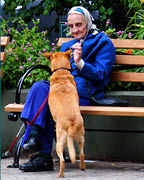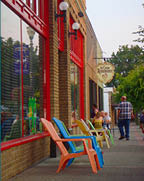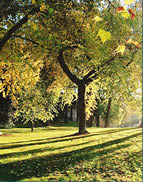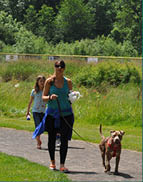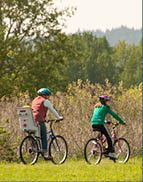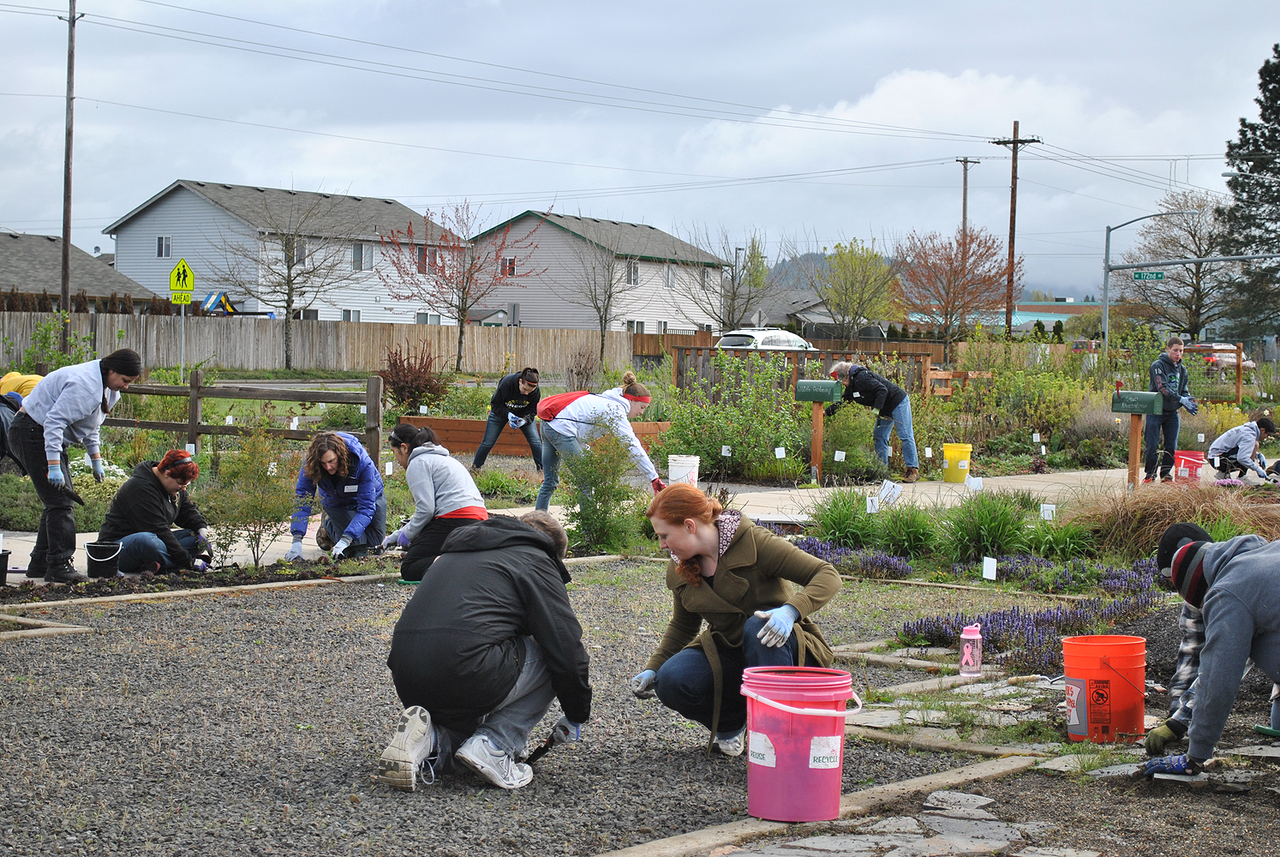
The Commission on Aging will be focusing this year on healthy communities. Features of a community either contribute to or decrease one's ability to live independently, safely and comfortably. Well-planned communities offer plenty of housing choices and nearby services so we, relatives and friends do not have to leave behind the people and places we know and love as we age and our circumstances change.
The Aging Readiness Plan identified four key areas that are essential in achieving healthy communities: complete neighborhoods; access to parks, recreation and open space; access to healthful food; and access to information.
The commission will be learning more about these areas along with others related to creating and maintaining healthy, livable communities that benefit all ages.
Staff contacts:
Jacqui Kamp, Planner III
jacqui.kamp@clark.wa.gov
564.397.4913
Jenna Kay, Planner II
jenna.kay@clark.wa.gov
564.397.4968
2019 Schedule
Presentation topics
|
|
|
|
|
|
|
|
The meetings begins at 4:30 p.m. and is at the Public Service Center, 6th Floor Hearing, 1300 Franklin St., Vancouver.
The next scheduled speaker(s) and topic:
Nov. 20: Older Adults and Pets: the Health Benefits and Challenges
Owning a pet can be physically and mentally beneficial for people of all ages. Animals can help reduce stress, lower blood pressure, and increase social interaction and physical activity. From companionship to security, pets can provide older adults a better quality of life and improve aging in place.
Speakers:
Cheri Martin and Bob Libby, Southwest Washington Humane Society
Related info:
The Healing Power of Pets - AgingCare.com
The Challenges and Benefits of Pet Ownership for Seniors - Psychology Today
Southwest Washington Humane Society - website
Oct. 16: Value of Engaging Older Adults
The number of older adults will dramatically increase over the next 10 years. Transforming how we think about the value of an aging population and how communities position themselves to harness the tremendous resource older adults provide will be beneficial for all.
Speakers:
Brinda Wood, Goodwill Industries - website
Colleen Kuhn, Human Services Council - slides
Justin Rossman, New Seasons Market - slides
Related info:
Age-Friendly Business Resource Guide - Age-Friendly NYC
engAGED National Resource Center for Engaging Older Adults
Retired Senior Volunteer Program
Senior Community Service Employment Program
Global Age-Friendly Cities: A Guide - World Health Organization
Sept. 18: Complete Neighborhoods
A healthy community has neighborhoods with a well-rounded offering of daily goods and services that can be reached within a comfortable walking distance. This includes convenient access to parks, community facilities, schools, libraries, and other shops and services. Having convenient access to these places promotes physical activity, reduces reliance on automobiles, and can improve neighborhood safety.
Speakers:
Rebecca Kennedy, City of Vancouver
Elizabeth Decker, JET Planning
Related info:
Understanding the Social Impacts of Neighborhood and Home Design for Older Adults in Portland, Oregon - Leah Brandis, RDN, CSG, LD and Alan DeLaTorre, PhD
Planning & Zoning for Health in the Built Environment - American Planning Association
Healthy Neighborhoods - Institute for Local Government
Aug. 21: Advance care planning/Health directives
Advance care planning is not just about getting older. At any age, a medical crisis could leave you too ill to make your own healthcare decisions. Even if you are not sick now, planning for health care in the future is an important step to insure you receive the medical care you would want, if you are unable to speak for yourself and others are making the decisions for you.
Speakers:
Daleasha Hall, PeaceHealth (presentation)
Melissa Ensey, PeaceHealth
April Duff, Peace Health
Related info:
National Institute on Aging - Advance Care Planning
PeaceHealth - Advance Care Planning Resources
June 19: Food Access and Health
A healthy community provides a readily available, affordable, and abundant selection of healthful eating options through conveniently located fresh produce markets, grocery stores, farmers’ markets and community gardens. The presence and access to neighborhood grocery stores and markets encourage higher fruit and vegetable consumption, which supports dietary needs and helps reduce the risk of many diseases.
Speakers:
Melissa Martin, Clark County Public Health
Martin slides
Ann Foster, Food Systems Council/Farmers Markets
Foster slides
Zena Edwards, WSU Extension
Edwards slides
Nina Davenport, Area Agency on Aging and Disabilities
Davenport slides
Related info:
The State of Senior Hunger in America, 2017 - Feeding America
Healthy Food, Healthy Communities - PolicyLink
Healthy Eating for Healthy Communities - Catholic Health Association
Community Benefit and Healthy Food - Healthcare without Harm
Healthy Eating - SNAP at Farmers Markets - Clark County Public Health
Community Food Production: The Role of Local Governments in Increasing Community Food Production for Local Markets - Growing Food Connections
National Diabetes Prevention - Centers for Disease Control
May 15: Trees and Healthy Communities
Trees are an essential component of a healthy, livable community. Trees and other natural features provide environmental benefits, such as providing clean air and water. They also beautify our streets, significantly increase property values, and improve our mental and physical health and well-being.Speakers:
Jesse Batty, Urban Forester, City of Vancouver
Batty slides
Sarah Fox, Planner, City of Camas
Fox slides
Related info:
Funding Trees for Health: An Analysis of Finance and Policy Actions to Enable Tree Planting for Public Health - The Nature Conservancy
The Benefits of Nearby Nature in Cities for Older Adults - Nature Sacred
Building Urban Resilience with Nature: A Practitioners Guide to Action - Rockefeller Foundation
The Human Health and Social Benefits of Urban Forests - Dovetail Partners
April 17: Parks, Recreation, and Health
Convenient access to parks, open spaces and quality recreational facilities and programs greatly increases the likelihood of physical activity. Regular participation in physical activity can provide social and emotional benefits by reducing depression and anxiety, improving mood and maintaining a healthy lifestyle.Speakers:
David Cohen, Program Manager, The Intertwine
Cohen Slides
Marie Bouvier, Ridgefield Parks Board member
Bouvier Slides
Angela Brosius, City of Vancouver, Firstenburg Center Director
Brosius Slides
Related info:
Vancouver Parks and Recreation: Fifty and Better
Creating Parks and Public Spaces for People of all Ages - AARP, 880 cities, and The Trust for Public Land
Placemaking for an Aging Population: Guidelines for Senior-Friendly Parks - UCLA
This Land is Our Land: A Primer on Public Land Ownership and Opportunities for Recreational Access - ChangeLab Solutions
March 20: Healthy Communities, Healthy Aging
Older adults who practice good physical, psychological and social behaviors are more likely to remain healthy, live independently and incur fewer health-related costs. These outcomes often are achieved in communities that address basic needs, promote optimal health and well-being, foster civic and social engagement, and support the independence of an aging population. A healthy community is a livable community for people of all ages.
Speaker: Alan DeLaTorre, Ph.D., Portland State University, Institute on Aging
Related info:
Ten Principles for Building Healthy Places - Urban Land Institute
Resource Guide for Healthy Community Planning - Washington Chapter American Planning Association
Planning and Zoning for Health in the Built Environment - American Planning Association
Healthy Communities Policy Guide - American Planning Association
Promote Healthy Communities: Joint Call to Action - Multiple organizations
